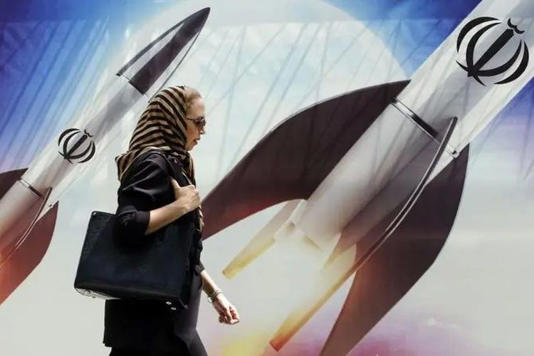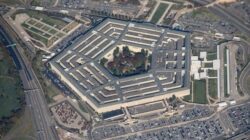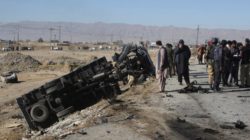The United States (US), United Kingdom, and European Union (EU) have expanded sanctions against Iran in response to Iran’s drone and missile attack on Israel on April 13, 2024. This round of US sanctions targets Iran’s drone program, steel manufacturers, and companies associated with the Islamic Revolutionary Guard Corps (IRGC) and the country’s Ministry of Defense.
President Joe Biden stated that the leaders of the G7 are committed to collectively increasing economic pressure on Iran.
“Our allies and partners have either issued or will issue sanctions and additional actions to limit Iran’s destabilizing military program,” said Biden.
Since Biden took office three years ago, the US has imposed more than 600 sanctions on entities related to Iran, according to data from the US Department of the Treasury.
The IRGC is also targeted in the UK’s sanctions this time. Previously, the UK had imposed 400 sanctions on Iran.
The EU has also agreed to expand sanctions against Iranian drone and missile manufacturers after previously imposing sanctions on Iran related to the sale of drones to Russia for use in the conflict in Ukraine.
The expansion of sanctions is taken to minimize further military escalation. Instead of pushing Israel to retaliate, diplomatic channels are being utilized.
The Israeli government has repeatedly threatened to retaliate against Iran’s attack. Israeli Prime Minister Benjamin Netanyahu said Israel will “do whatever it takes to defend itself.”
However, British Foreign Secretary Lord Cameron, in his meeting with Netanyahu on April 17, said that any response must be done “smartly” and limited. British Prime Minister Rishi Sunak warned that “significant escalation will only deepen instability in the region.”
If the Iran-Israel conflict continues to escalate, is Iran’s economy capable of facing that escalation?
Iran is Not Economically Ready for War
Iran’s economy relies heavily on oil trading. For Iran, the billions of dollars in oil trade revenue play a crucial role in domestic stability.
Similarly, Iran’s ability to defend itself from military escalation with Israel will greatly depend on how new Western sanctions affect oil exports. Although previous Western sanctions have proven to have little significant impact on Iran’s oil trade, Iran still needs to be cautious.
Furthermore, there is growing concern among Iranian officials about the potential for Israeli attacks on oil installations in Iran.
Iran’s economy, on the other hand, is also squeezed by inflation.
Djavad Salehi-Isfahani, an economics professor at Virginia Polytechnic Institute and State University, told DW that geopolitical tensions will only worsen consumer price increases in Iran. In February alone, Iran’s inflation reached a record high of around 40 percent.
Salehi-Isfahani emphasized that in recent weeks, the US dollar has strengthened by about 15 percent against the Iranian rial.
“This rapid exchange rate devaluation results in higher prices, as Iran imports many types of commodities, and many commodities produced in Iran also have imported components,” he said, adding that the country must “prepare to face higher inflation.”
According to Salehi-Isfahani, the standard of living for Iran’s middle class has also sharply declined in recent years. In fact, it seems to be “going back 20 years.”
In addition to inflation, Iran’s economy is also unstable due to rampant corruption and lack of transparency. According to the 2023 Corruption Perceptions Index issued by Transparency International, Iran scored 24 out of 100, placing it at 149 out of a total of 180 countries. It is important to note that the assessment is evaluated on a scale of 0-100, where 0 means very corrupt and 100 very clean.
The IRGC, a paramilitary elite force in Iran’s armed forces, along with numerous religious organizations, is also reported to control important parts of Iran’s economy. They are primarily accountable to Supreme Leader Ayatollah Ali Khamenei, who serves as head of state and commander-in-chief in Iran. They are not required to pay taxes and are not required to submit financial reports.
In Iran, a significant portion of state revenue is reported to be lost to an unclear governance structure in Tehran.
Overall, Iran’s economy is still lagging behind Israel’s. On one hand, Iran’s population is nearly ten times larger than Israel’s, which has only 9 million inhabitants. However, Iran’s GDP in 2022 was lower than Israel’s, at $413 billion at the end of the year compared to Israel’s GDP of $525 billion.
So, is Iran ready for war? The most likely answer is no.
Salehi-Isfahani argues that Iran is “not ready” for prolonged military conflict with Israel.
“That’s why they are very cautious not to get too involved in the Gaza war. Instead of intending to harm, the attacks they carry out against Israel are more symbolic,” Salehi-Isfahani said.










